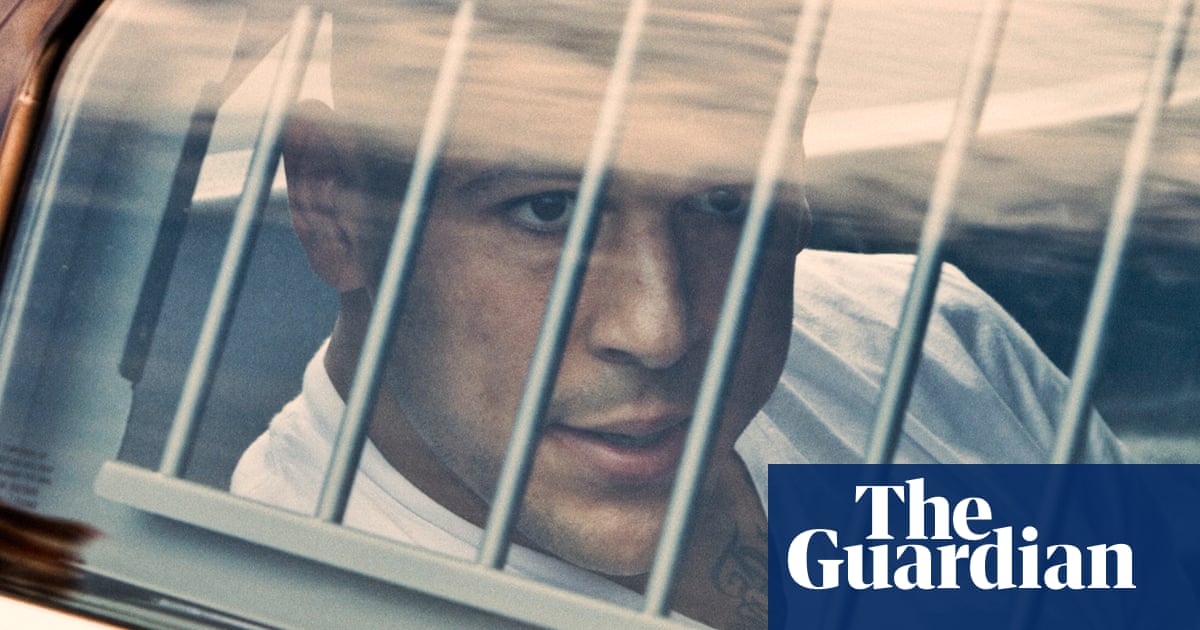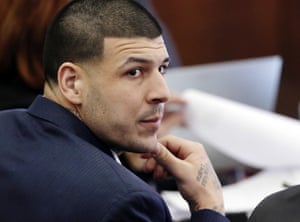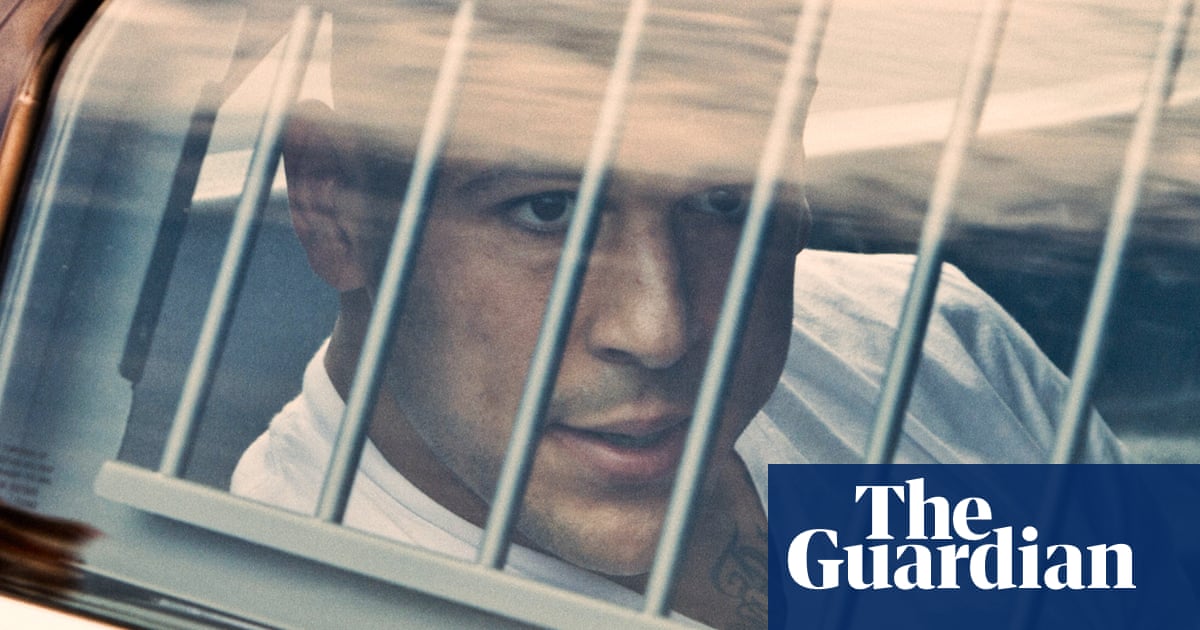Aaron Hernandez: how did a $40m NFL star become a convicted killer?
In a Netflix docuseries, the shocking true story of a much-loved athlete convicted of first-degree murder is placed under the microscope

Even by the standards of Americas obsession with stories of spectacular falls from grace, the trajectory of Aaron Hernandez, a star New England Patriots football player turned convicted murderer, was particularly steep and unusually compelling a senseless, horrific collapse unfolding in real time.
Three years before fake news became an ominous catch-all, Hernandezs summer 2013 arrest for the murder of Odin Lloyd at his mansion in North Attleborough, Massachusetts a news frenzy scene replayed in the first minutes of Netflixs new series Killer Inside: The Mind of Aaron Hernandez seemed to be just that: unreal. The facts of the case a brutal execution-style murder of his fiancees sisters boyfriend at a gravel pit down the street from his house were irreconcilable with the image of an all-American sports figure. Hernandez, then 23, had just signed a $40m contract with one of the most successful sports organizations in the US, lived with his fiancee and baby daughter, and performed seamless feats of athleticism under the national spotlight every Sunday.
But investigators soon uncovered a strange, violent shadow to the amiable football star: evidence he was responsible for an unsolved 2012 drive-by shooting in downtown Boston of two men, Daniel Jorge Correia de Abreu and Safiro Teixeira Furtado, who allegedly spilled a drink on Hernandez at a club by accident; violent outbursts from his time on the national championship team at the University of Florida, swept under the rug; a former friend who testified Hernandez shot him in the face and left him for dead in a parking lot.
Killer Inside: The Mind of Aaron Hernandez, now available on Netflix, attempts to sew together his double life into a single, coherent narrative, or at least a more contextualized one. The three-part docuseries offers the most comprehensive visual account yet of the Hernandez story, which has inspired by now a library of content, from day-by-day reports at his two trials (he was acquitted of the drive-by in 2017 with the help of the celebrity attorney Jose Baez), to the Boston Globes critically acclaimed podcast Gladiator, which, like the series, examines Hernandezs larger environment and personal history his sexuality, abusive upbringing, massive celebrity and postmortem diagnosis of chronic traumatic encephalopathy (CTE), a degenerative brain disease associated with repeated head injuries. (Hernandez killed himself in prison in April 2017.)
Director Geno McDermott began working on what at the time was a documentary feature on Hernandez in January 2017, before the start of his second trial. His partners on the project, journalists Kevin Armstrong and Dan Wetzel, both executive producers, had been developing a book on Hernandez since his first trial in 2015; Armstrong had been covering Hernandez since his high school days in Bristol, Connecticut. Their initial film, My Perfect World: The Aaron Hernandez Story, premiered at Doc NYC in 2018. But as fascination with the Hernandez case continued and more information emerged specifically, confirmation of Hernandezs closeted sexuality (he publicly dated women and privately, according to several participants in the series, had sex with men) and of CTE McDermott and his team realized the story demanded a longer series. I always expected this to end, he said of the Hernandez saga. And it just never ends. Theres constantly new developments, new books coming out, new people talking.

Killer Inside attempts, over the course of three hour-long episodes, to untangle the many supercharged cultural threads undergirding Hernandezs life, among them: the death of his domineering and allegedly abusive father when he was 16, the pressure to conform to a hypermasculine sports ideal, the double life of closeted sexuality, the allure of guns as an assertion of masculinity, the unwavering fanaticism of college football, the impunity permitted by fame, the prioritization of winning football games over literally anything else. Perhaps, it hopes, theres clear why at the center of all this.
Its a futile project, as the production team acknowledges both in and outside the series; Hernandez is no longer around to offer insight. His closest confidante, cousin Tanya Singleton, died of breast cancer in 2015. The production team reached out to hundreds of people who could speak to Hernandezs life, according to McDermott, but his mother (with whom Hernandez was mostly estranged), brother and fiancee all declined to participate in the series.
Instead, the series relies on testimony from a tapestry of perspectives from every walk of life in which Aaron was involved, said McDermott, including: Dennis SanSoucie, Hernandezs high school quarterback and secret lover for much of his adolescence, and his father, who was unaware of his sons relationship with the star tight end until after Hernandezs death; former Patriots offensive tackle Ryan OCallaghan, who speaks to the pressure to stay silent as a gay man in football; Wetzel, Armstrong and other journalists covering the case; and friends of Lloyd, who provide a much-needed portrait of the lives Hernandez ended and the loved ones they left behind.

In lieu of Hernandezs own explanation, the series also works in long excerpts of his phone calls from prison to his mother, old teammates, Singleton, his fiancee and others. The audio clips, culled from hundreds of calls the production team obtained through Foia (Freedom of Information Act) requests, give everyone a look at who Aaron was, said McDermott. Hernandez is at turns despairing and jovial, weirdly at ease in his jail life, seemingly unconcerned with his crimes.
Wetzel doesnt have a single answer as to what went horribly wrong with Hernandez. I think it was a perfect cocktail of problems, he said. And there were many, many times when this could have gotten a walk back or he couldve gotten off the rails. He just never had the help or just made terrible decisions.
Over six-plus years of covering Hernandez, however, you certainly saw a guy who throughout his life projected outwardly what he thought people wanted to see, whether its buying the big house or having a daughter, having a fiancee, the tattoos, whatever it was, said Wetzel. Its almost like he spent his whole life searching for where he belonged and never found it.
McDermott said he hopes people walk away from the series, first and foremost, with a deeper understanding of the context around Hernandezs descent into violence, as well as perspective to continue conversations about sexuality in sports-dominated settings and the damage of CTE. Were presenting whats there, so its not like were offering an opinion, he said, but we do want people to have conversations about it.
The series is ultimately unsuccessful in explaining what is probably unexplainable: what turned Hernandez from a popular jock into a cold-blooded killer. But the hope, according to McDermott and Wetzel, is to illuminate the forces in Hernandezs life enough to make the context clearer and, perhaps, instructive for someone else. Youre never going to know why. The best we could do was put out the facts of the story and the viewer is going to decide what they think is why, said McDermott. Its important to keep these conversations going and for people to know the whole story.
-
Killer Inside: The Mind of Aaron Hernandez is now available on Netflix
Read more: https://www.theguardian.com/tv-and-radio/2020/jan/15/aaron-hernandez-netflix-documentary
